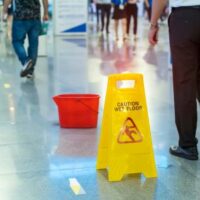Defenses to Slip and Fall Lawsuits in California

Everyone, but especially proprietors, owes their guests a duty of care to ensure that their premises are safe for invitees. Companies that invite members of the public onto their premises for their financial gain owe those invitees the highest duty of care. If you are someone who recently slipped and fell in a supermarket, hotel, department store, restaurant, gas station, or other business, you can file a lawsuit against this business to recover damages related to your medical expenses, lost wages, and reduced quality of life. However, the defendant is unlikely to simply say, “Yes, we were negligent, here’s $250,000.” They’re going to fight to claim it. To be a savvy plaintiff, you should be aware of the types of arguments you are likely to face when you file a slip-and-fall lawsuit in California. In this article, the Oakland slip-and-fall attorneys at Venardi Zurada will discuss the various defenses a defendant can raise when they are sued for a slip and fall.
Open and obvious danger
An “open and obvious danger” defense argues that the plaintiff should have been aware of the dangerous condition because they were open and obvious to everyone. The defendant will claim that the plaintiff is primarily responsible for their own injuries because they failed to exercise ordinary care and placed themselves in danger.
A seasoned personal injury attorney will know how to handle this defense. The fact that a danger may have been obvious does not absolve the company from maintaining safe premises.
Lack of notice
One major aspect of a premises liability claim is that the store employees must have been aware of the potential danger prior to the individual slipping and falling. If a defendant claims that they didn’t have prior notice, they are saying that there was no way that they could have foreseen the danger. To prove negligence, you must establish that the danger was foreseeable. Lack of notice becomes a way to defeat a premises liability claim in many cases.
Personal injury attorneys encounter this defense all the time. We can argue that the company either was aware of the dangerous condition and did nothing to remedy it or that the company should have been aware of the dangerous condition but failed to exercise ordinary care.
Reasonable care
A defendant can say that they took several steps in order to avoid a slip hazard on their premises. This would look like placing a “Caution: Wet Floor” sign in an area with a recent spillage. This defense can be used in conjunction with a “lack of notice” defense or a “open and obvious hazard” defense.
Comparative negligence defense
If the proprietor is negligent, they can claim that the plaintiff contributed negligence to their own injury by (for example) looking at their cell phone while they were walking around the store. In this case, they may reduce the amount of blame they share in causing the accident, and so reduce the amount of money they have to pay to the plaintiff. A plaintiff who is held 50% liable for their own injuries can only recover 50% of their overall damages.
Talk to an Oakland, CA Slip and Fall Accident Attorney Today
Venardi Zurada works on behalf of injured plaintiffs who have sustained injuries in slip-and-fall lawsuits. Call our Oakland personal injury lawyers today to schedule an appointment, and we can begin investigating your claims right away.

 The Official Injury Attorneys of the San Francisco 49ers
The Official Injury Attorneys of the San Francisco 49ers